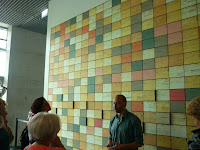Best meal (simple): the falafel and sides at Dada's, on Linienstrasse, right below Friedrichstrasse, in Mitte; another Best Ever.
Best music (expensive): Beethoven's Missa Solemnis, performed by the orchestra, choir and soloists of the Berlin Philharmonic, June 3.
Best music (free): Bach's First Prelude for Unaccompanied Cello, performed in a square in Weimar by a young musician.
 |
| Freundlich katz (friendly cat) |
Best animal moments: 1) the endangered white storks, feeding in a field, we viewed from the bus while travelling between Dresden and Berlin, June 5. 2) the mouse with a single stripe down his back Eddie and I saw while strolling around the garden of artist Max Lieberman in Wannsee, June 4; 3) the cat we finally met (after nearly two weeks of all-dog, no-cat streets) in Weimar, who approached shyly but ended up cavorting with us like an old friend.
 |
| Max Lieberman house & garden, Wannsee |
 |
| Sebastian, Topographie des terrors |
Best learning experience: Topographie des Terrors, thanks to our guide, Sebastian G.
Most beautiful interior: the church in Aachen, tied with the Nikolaikirche in Leipzig. N.B. This is a correction from the original post.
Most beautiful streets: the old, winding ones in Lübeck.
Best street with mix of commercialism, charm, walkability: Friedrichstrasse, Mitte, Berlin.
Best street with mix of commercial and residential: Tucholskystrasse, same area.
Most overrated tourist site: Brandenburg Tor.
Most touristy big city: Cologne.
Quietest tourist town: Weimar.
Best hotels: Leonardo Hotel, Weimar; Augustinenhof, Berlin.
Best museum: Cologne's Wallraf (European art from several centuries).
